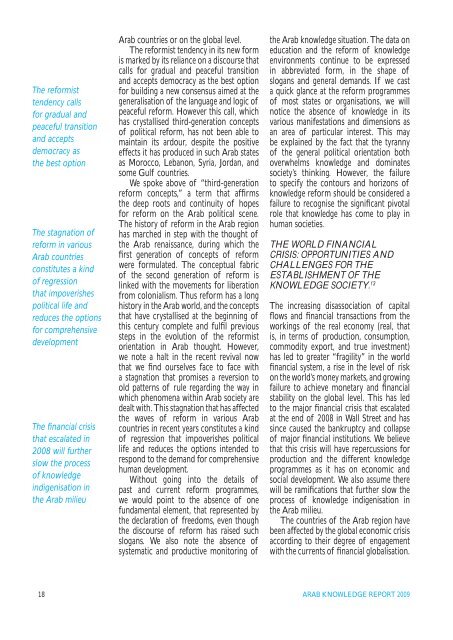Arab Knowledge Report 2009: Towards Productive
Arab Knowledge Report 2009: Towards Productive
Arab Knowledge Report 2009: Towards Productive
- No tags were found...
You also want an ePaper? Increase the reach of your titles
YUMPU automatically turns print PDFs into web optimized ePapers that Google loves.
The reformisttendency callsfor gradual andpeaceful transitionand acceptsdemocracy asthe best optionThe stagnation ofreform in various<strong>Arab</strong> countriesconstitutes a kindof regressionthat impoverishespolitical life andreduces the optionsfor comprehensivedevelopmentThe financial crisisthat escalated in2008 will furtherslow the processof knowledgeindigenisation inthe <strong>Arab</strong> milieu<strong>Arab</strong> countries or on the global level.The reformist tendency in its new formis marked by its reliance on a discourse thatcalls for gradual and peaceful transitionand accepts democracy as the best optionfor building a new consensus aimed at thegeneralisation of the language and logic ofpeaceful reform. However this call, whichhas crystallised third-generation conceptsof political reform, has not been able tomaintain its ardour, despite the positiveeffects it has produced in such <strong>Arab</strong> statesas Morocco, Lebanon, Syria, Jordan, andsome Gulf countries.We spoke above of “third-generationreform concepts,” a term that affirmsthe deep roots and continuity of hopesfor reform on the <strong>Arab</strong> political scene.The history of reform in the <strong>Arab</strong> regionhas marched in step with the thought ofthe <strong>Arab</strong> renaissance, during which thefirst generation of concepts of reformwere formulated. The conceptual fabricof the second generation of reform islinked with the movements for liberationfrom colonialism. Thus reform has a longhistory in the <strong>Arab</strong> world, and the conceptsthat have crystallised at the beginning ofthis century complete and fulfil previoussteps in the evolution of the reformistorientation in <strong>Arab</strong> thought. However,we note a halt in the recent revival nowthat we find ourselves face to face witha stagnation that promises a reversion toold patterns of rule regarding the way inwhich phenomena within <strong>Arab</strong> society aredealt with. This stagnation that has affectedthe waves of reform in various <strong>Arab</strong>countries in recent years constitutes a kindof regression that impoverishes politicallife and reduces the options intended torespond to the demand for comprehensivehuman development.Without going into the details ofpast and current reform programmes,we would point to the absence of onefundamental element, that represented bythe declaration of freedoms, even thoughthe discourse of reform has raised suchslogans. We also note the absence ofsystematic and productive monitoring ofthe <strong>Arab</strong> knowledge situation. The data oneducation and the reform of knowledgeenvironments continue to be expressedin abbreviated form, in the shape ofslogans and general demands. If we casta quick glance at the reform programmesof most states or organisations, we willnotice the absence of knowledge in itsvarious manifestations and dimensions asan area of particular interest. This maybe explained by the fact that the tyrannyof the general political orientation bothoverwhelms knowledge and dominatessociety’s thinking. However, the failureto specify the contours and horizons ofknowledge reform should be considered afailure to recognise the significant pivotalrole that knowledge has come to play inhuman societies.THE WORLD FINANCIALCRISIS: OPPORTUNITIES ANDCHALLENGES FOR THEESTABLISHMENT OF THEKNOWLEDGE SOCIETY. 13The increasing disassociation of capitalflows and financial transactions from theworkings of the real economy (real, thatis, in terms of production, consumption,commodity export, and true investment)has led to greater “fragility” in the worldfinancial system, a rise in the level of riskon the world’s money markets, and growingfailure to achieve monetary and financialstability on the global level. This has ledto the major financial crisis that escalatedat the end of 2008 in Wall Street and hassince caused the bankruptcy and collapseof major financial institutions. We believethat this crisis will have repercussions forproduction and the different knowledgeprogrammes as it has on economic andsocial development. We also assume therewill be ramifications that further slow theprocess of knowledge indigenisation inthe <strong>Arab</strong> milieu.The countries of the <strong>Arab</strong> region havebeen affected by the global economic crisisaccording to their degree of engagementwith the currents of financial globalisation.18 ARAB KNOWLEDGE REPORT <strong>2009</strong>
















